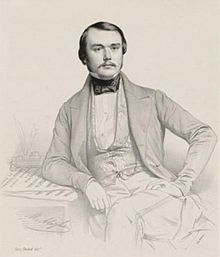Alexandre Édouard Goria (21 January 1823 – 6 July 1860) was a French virtuoso pianist and composer recognised among amateurs enthusiasts for his numerous salon pieces of different styles, which enjoyed great success at their time. The number of fancy arrangements and transcriptions by Goria of selected motifs from great operas proves the composer's great facility and the popularity of his name, which had commercial value. He was a favorite artist of lovers of brilliant music, concert and salon music.
Alexandre Goria | |
|---|---|
 French composer Alexandre Édouard Goria | |
| Background information | |
| Genres | Classical |
| Occupation | Composer |
| Instrument | Piano |
Biography
editAlexandre Goria was born in Paris and admitted as a student at the age of seven to the Conservatoire de Paris on 15 November 1830.[1] He had for piano teachers Adolphe-Francois Laurent (1796–1867), teacher of Jules Massenet, and Pierre-Joseph-Guillaume Zimmerman,[2] teacher of Charles-Valentin Alkan and César Franck, following a course of harmony under the direction of Victor Dourlen shortly thereafter.[1]
In 1834, he won second prize in the competition of piano,[3] being awarded the first prize the following year at the age of 12.[1] He later became répétiteur of the classes of competition in the conservatory.[4] His studies were completed in 1839.[1] Since then he engaged himself in teaching, becoming professor at the Maison Impériale de Saint-Denis in 1854 and a well-known figure thereafter in the music world by many different kinds of pieces for the piano.[5]
He was in very good terms with Bohemian composer Carl Czerny when he lived in Vienna for some time,[6] and was also a very close friend of the American composer Louis Moreau Gottschalk, who dedicated his composition Le Bananier to him.[7] Awarded with the Knight's Cross of the Order of Charles III by the Queen of Spain,[8] he died at the age of thirty-seven in Paris on 6 July 1860.[9] following a cerebral convulsion and an aneurysm. His young wife was to follow him a few years later herself suffering from a cruel and painful illness.[10]
Music
editGoria wrote over a hundred works for piano, including studies, fantasias, whims, solo concerts, nocturnes of various themes, polkas, mazurkas, lullabies, ballads and "révêries". He was a highly acclaimed musician specially for his Étude de concert, Op. 7 and his brilliant fantasias for piano on many theatrical works such as Plaintes de la jeune fille and other transcriptions of lieder by Franz Schubert and other composers.
See also
editReferences
edit- ^ a b c d Brofeldt, Hans. "Alexandre Édouard Goria". Piano Music for the Left Hand Alone. Left-hand-brofeldt.dk. Archived from the original on 6 May 2012. Retrieved 18 July 2012.
- ^ Brown, James Duff. "Ebooks of the author James Duff Brown". GORIA (Alexandre Edouard). Ebooksread.com. Retrieved 18 July 2012.
- ^ Fétis, François-Joseph (1869). Biographie universelle des musiciens et bibliographie génèrale de la musique, Vol. 4 (in French). Firmin-Didot. pp. 60. OCLC 174729129.
Pianiste et compositeur Goria.
- ^ Emile Marco de Saint-Hilaire; Joseph Louis Hippolyte Bellangé; E Lamy (1847). Histoire anecdotique, politique et militaire de la Garde impériale (in French). Paris: E. Penaud. p. 4. OCLC 504448737.
- ^ M.E. Darsy (1895). Dictionnaire Général de Biographie et d'Historie. C. Delagrave. p. 1273.
- ^ Lemoine, Henry. "Czerny, Carl: Nocturnes". Éditions Henry Lemoine. Archived from the original on 25 January 2013. Retrieved 17 July 2012.
- ^ Starr, S. Frederick (2000). Louis Moreau Gottschalk. University of Illinois Press. p. 87. ISBN 025-206-876-9.
- ^ Gazette Musicale (1857). Gazette Musicale de Paris (in French). Paris: Gazette Musicale de Paris. p. 125. OCLC 11734782.
- ^ Fétis, François-Joseph (1862). Biographie universelle des musiciens et bibliographie generale de la musique: Gib-Kaz (in French). Didot.
- ^ Le Ménestrel (in French). 1878.